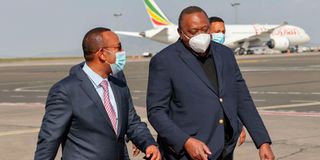To prosper, look beyond the shore

President Uhuru Kenyatta and Ethiopian Prime Minister Abiy Ahmed are pictured at Bole International Airport in Addis Ababa on June 8, 2021.
What you need to know:
First, we must start recognising our economies not just as our biggest national security concerns but the determinants of whether we live or die.
Secondly, we must enter a more urgent phase of public education so that we can acquire the information we need to participate in securing our own survival.
Being anointed by elders to become tribal mouthpieces is a backward, useless thing with no place in our future and will not help a country whose median age is 19.5 years.
If we are to survive and prosper in the next 50 years, we must stop being corrupt, educate ourselves better about our country and our needs and stop thinking about our villages and think more about investing and partnering with other Africans.
The population of Africa is 1.37 billion. By next year but one, Africa will be more populous than India and China. The population of this continent will double in our lifetime — if we live to be 75. So, more than 2.5 billion people will be living in Africa by 2050, meaning that a quarter of humanity will be calling this continent home.
This in a continent whose rivers are drying up and food will soon become really hard to come by. And there is a democratic reversal going on with the Obiang Nguemas, Denis Sassou Nguessos and Ali Bongos of this world preparing their children to take over and finish off what is left of their countries. Africa, and ourselves, need a new kind of thinking.
First, we must start recognising our economies not just as our biggest national security concerns but the determinants of whether we live or die.
Secondly, we must enter a more urgent phase of public education so that we can acquire the information we need to participate in securing our own survival.
Smart partnerships
Thirdly, we need to be smart about identifying the partners who complement not just our own efforts but of other nations that are in the same basket as ourselves.
We must look outside our country, not for opportunities to exploit other countries of their resources but smart partnerships where we invest our capabilities in win-win arrangements. I think the priority should be countries that can sort out their own problems but also others’. I think companies such as KCB, Equity, Safaricom and others are making the right moves and are the standard-bearers of the trends of the near future.
The Democratic Republic of the Congo is one of the most fascinating countries in Africa. First, its people are some of the poorest on the continent, earning on average $580 (Sh61,480) a year. Kenya’s GDP per capita is more than three times that. Dubai’s is $48,00 and Botswana’s about $7,000. Yet all those countries, with their wealth, are nothing compared to DRC.
It’s impossible to figure out what God intended when He created that country. He took most of the world’s wealth and put it in that country of about 100 million people.
First, every conceivable mineral exists in DRC and in abundance. It has 1,100 listed minerals and precious metals — uranium, petroleum, platinum, coal, iron ore, copper, gold, diamonds (both industrial and gem) and Africa’s richest limestone deposits.
And it’s huge — almost the size of Western Europe — and half of it is tropical. The biodiversity preserved in Congo Forest is dizzying. Unlike us, DRC not only has lots of water but its rivers meander around looking for places to form falls and rapids. As a result, it has half of Africa’s hydroelectric potential and an eighth of the world’s. A single dam project, the Grand Inga, will be the biggest hydropower producer with a capacity of 68.9 gigawatts — enough to light most, if not all, of sub-Saharan Africa.
Future of our region
DRC can play a big role in feeding those 2.5 billion Africans. It has 224,500 square kilometres of agricultural land, according to the Food and Agriculture Organization, with 80 hectares classified as arable. It has the land and the people to till it; Africa has the mouths to feed. We probably need to remind the Congolese that we came from Congo Forest and that it is right and fair for us to return to the land of our fathers.
The other county is Ethiopia, which is crucial for the future of our region — not necessarily because of its enormous size (it is also big) or its resources but its power. Whether we like it or not, Ethiopia is the military and diplomatic power of our region. Since 1964, when we signed a defence treaty, Ethiopia has been the guarantor of Kenya’s peace and independence: Without Ethiopia, General Mohamed Siad Barre, the Soviet-backed Somalia dictator, would have invaded Kenya a long time ago.
Our fathers walked to Ethiopia to get guns and military training in the 1940s and’ 50s for the war against colonialism. Nelson Mandela received army training from Emperor Haile Selassie. The centrality of Ethiopia is not just its huge army of 162,000 which looks rather poorly armed; it is the spirit of nationhood that has been formed since the Aksumite Empire dating to 80BC. This ancient state is a lesson to the continent of how nationhood can be formed and endure war, famine and the passage of millennia.
When my ancestors were sniffing tobacco, stealing cattle and calling curses down on each other, the Ethiopians were fighting off mighty empires: In 1876, they repelled an Egyptian attempt at conquest and 20 years later, in 1896, beat back an Italian invasion.
For survival, Africa should come out of the village and discover other lands.





